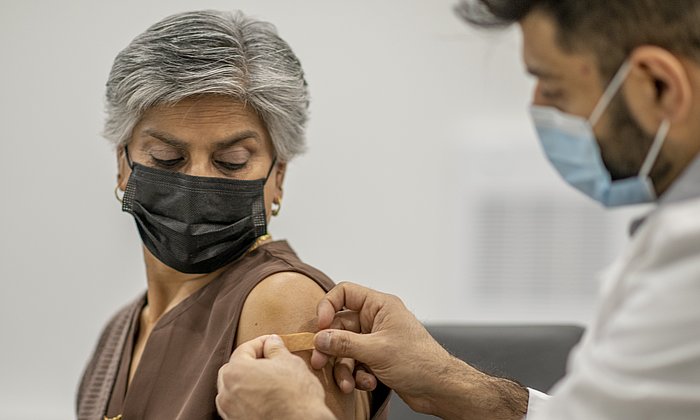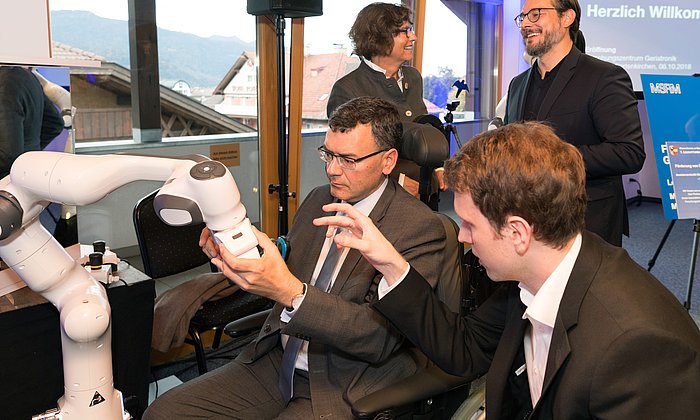Treatment with amino acid extends lifespan in animal experiment
Study: Ingestion of taurine delays aging

The researchers showed that the taurine concentration in the blood of mice, monkeys and humans decreases in old age. In blood samples taken from persons over 60, it was more than 80% lower than in children and adolescents. For the team working with Vijay Yadav, PhD, assistant professor of genetics & development at Columbia University Vagelos College of Physicians and Surgeons, this led to the central question: can the aging process be slowed down by raising taurine concentrations to a “young” level?
Experiments in which animals were given doses of taurine indeed yielded significant results. A daily dose of taurine resulted in a 10-12% increase in life expectancy of mice. Worms (C. elegans) also lived longer. Both in mice and rhesus monkeys, taurine treatment also increased the ‘healthspan’. This term is used by aging researchers to describe the duration over which individuals remain healthy. The researchers have not yet identified a clear mechanism underlying the positive effects of taurine.
Transfer of results to humans
Henning Wackerhage, Professor of Excercise Biology at TUM, and his team provided data on human test subjects for the study. “The results of the animal experiments are impressive,” says Prof. Wackerhage. “But we don’t know whether they can be applied to humans. Now we need large human studies to find out whether taurine enables people to live healthier longer and whether there are previously unknown side effects, interactions with other substances or similar issues.”
The amino acid taurine has so far been considered harmless. It is obtained through foods and especially meat but the body also produces taurine itself. In 2012 a specialized panel of the European Food Safety Authority (EFSA) declared the daily consumption of 6 grams of taurine from foods and other sources as safe.
Indications of link between taurine and age-related illnesses
Henning Wackerhage and his cooperation partners in Munich found several indications suggesting a link between age-related conditions in humans and taurine deficiency. For example, a low taurine level was associated with an elevated risk of various illnesses that become more common as people get older – including diabetes, high blood pressure and higher inflammation values. Conversely, the researchers show a link between exercise and the increased production of taurine in the body. “This insight coincides with observations of positive health effects from sporting activity as people get older,” says Wackerhage.
P. Singh, K. Gollapalli, S. Mangiola, D. Schranner, M.A. Yusuf, M. Chamoli, S.L. Shi, B. Lopes Bastos, T. Nair, A. Riermeier, E.M. Vayndorf, J.Z. Wu, A. Nilakhe, C.Q. Nguyen, M. Muir, M.G. Kiflezghi, A. Foulger, L. Turcios-Hernandez, A. Junker, J. Devine, K. Sharan, S.J. Chinta, S. Rajput, A. Rane, P. Baumert, M. Schönfelder, F. Iavarone, G. di Lorenzo, S. Kumari, A. Gupta, R. Sarkar, C. Khyriem, A.S. Chawla, A. Sharma, N. Sarper, N. Chattopadhyay, B.K. Biswal, C. Settembre, P. Nagarajan, K.L. Targoff, M. Picard, S. Gupta, V. Velagapudi, A.T. Papenfuss, A. Kaya, M. Godinho Ferreira, B. K. Kennedy, Julie K. Andersen, G.J. Lithgow, A. Mahmood Ali, A. Mukhopadhyay, A. Palotie, G. Kastenmüller, M. Kaeberlein, H. Wackerhage, B. Pal, V.K. Yadav. "Taurine deficiency is a driver of aging". Science (2023). DOI: 10.1126/science.abn9257.
Technical University of Munich
Corporate Communications Center
- Paul Hellmich
- paul.hellmich@tum.de
- presse@tum.de
- Teamwebsite
Contacts to this article:
Prof. Dr. Henning Wackerhage
Technical Unicersity of Munich
Professurship of Excercise Biology
Tel.: +49 (89) 289 - 24480
henning.wackerhage@tum.de
www.sg.tum.de/exercisebiology/


![[Translate to en:] Prof. Wackerhage in seinem Labor. [Translate to en:] Prof. Dr. Henning Wackerhage in seinem Labor.](/fileadmin/_processed_/4/0/csm_200525_Wackerhage_AH_598887_2100_f1089e709e.jpg)
